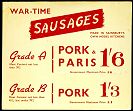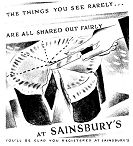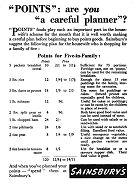|
Fair Shares |
|||||||||||
Sainsbury's responded to the trading difficulties it faced by emphasising its traditional strengths. Advertisements were placed in the national newspapers giving general advice about rationing and stressing the far greater choice of goods to be found in a Sainsbury's store compared with its main competitors. Customers were reminded that a trip to Sainsbury's was more convenient than visiting half a dozen specialist shops during the blackout. Sainsbury's also introduced a 'Fair Shares' scheme using 'points'. The objective of this was to ensure that goods in short supply - such as sausages, cake, meat pies, blancmanges and custard powder - were distributed evenly. Customers were allowed a number of points, according to the number of rationed goods for which they were registered. The scheme encouraged customers to register for all rationed goods at Sainsbury's.
The scheme was noted by the Ministry of Food. On 1 December 1941 the government introduced its own points scheme covering a wide range of grocery lines.
Despite the 'Fair Shares' scheme, many customers became frustrated at the long queues that formed for unrationed items. As the daily bulletin put it; The knack of keeping happy those customers who are waiting is one of the greatest gifts which a saleswoman can possess To ease the situation Sainsbury's developed a system known as 'call backs'. This enabled a customer to leave her shopping list at the store and call back later to collect her purchases. The scheme was designed to give priority to working people who had less time to do their shopping. In areas where there were large numbers of factory workers, Sainsbury's made arrangements for stores to remain open late one evening a week to enable workers to collect their orders.
|


